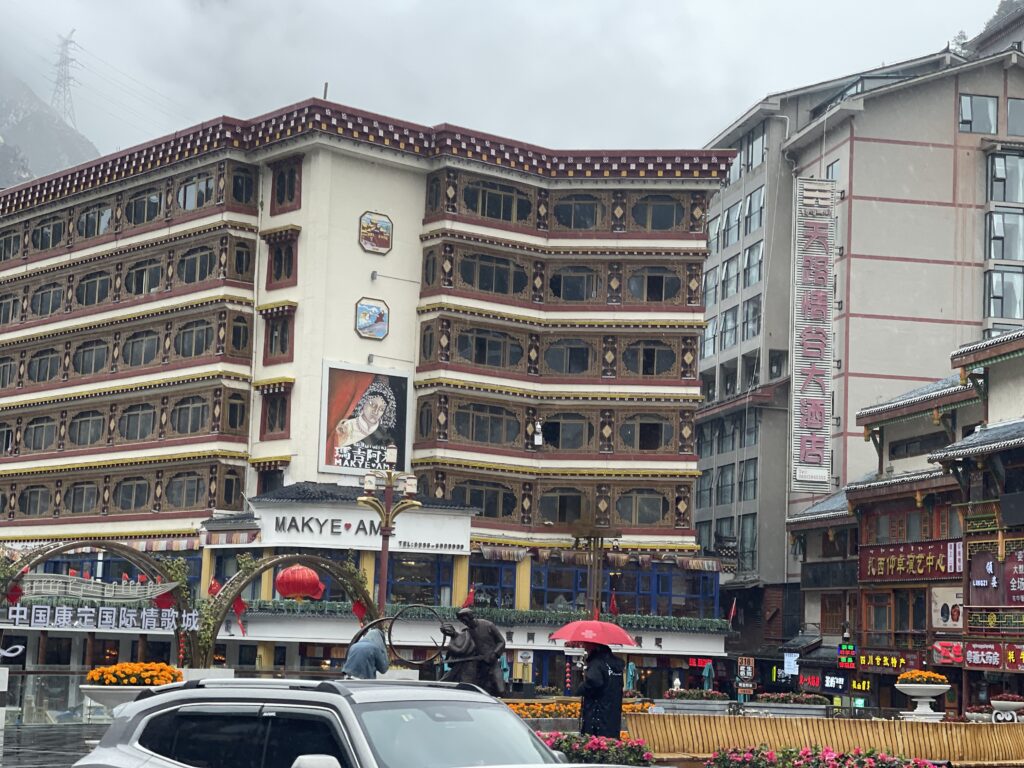
Kangding (康定), often regarded as the gateway to the Tibetan plateau, is a historic town and capital of Garze Tibetan Autonomous Prefecture in western Sichuan, China. Nestled in a deep valley along the rushing Dadu River, Kangding holds cultural, historical, and natural significance as a central hub connecting Tibetan and Han Chinese cultures. Here’s an overview of what makes Kangding unique and what visitors can experience there:
A Fusion of Tibetan and Han Cultures: Kangding sits on the border of Tibet and Sichuan, making it a unique melting pot where Tibetan, Han, and other ethnic groups coexist. This cultural fusion is visible in its architecture, food, and local festivals.
Kangding Love Song: The city is famous in China for the “Kangding Love Song,” a traditional song celebrating romance and beauty, which has made Kangding a symbol of Tibetan culture within China.
Historic Trade Route: Historically, Kangding was an essential stop on the Tea Horse Road, an ancient trade route connecting Sichuan and Tibet. This strategic location facilitated the trade of tea, salt, and horses, influencing local customs and architecture.
Natural Beauty
Paoma Mountain (跑马山): A scenic mountain overlooking Kangding, Paoma Mountain is a popular spot for panoramic views of the town and surrounding valleys. It’s also known for its connection to the “Kangding Love Song” and has a temple and viewing platforms.
Mugecuo Lake (木格措): Located around 20 kilometers from Kangding, Mugecuo Lake, also known as “Wild Man Lake,” is a stunning alpine lake surrounded by meadows, forests, and hot springs. Visitors can take a dip in the hot springs and enjoy hikes around the lake’s clear waters.
Gongga Mountain (贡嘎山): Known as the “King of Sichuan Mountains,” Gongga Mountain is Sichuan’s highest peak (7,556 meters) and offers trekking, photography, and adventure opportunities. Hailuogou Glacier Park, located at the foot of Mount Gongga, offers close-up views of glaciers and ice formations.
Historical and Religious Sites
Anjue Monastery: A prominent Tibetan Buddhist monastery in Kangding, Anjue Monastery is a tranquil place for visitors to learn about Tibetan Buddhism, watch monks at prayer, and appreciate Tibetan architecture.
Nanwu Monastery: Another important monastery, it reflects the Tibetan Buddhist culture in Kangding and hosts religious activities and festivals, making it a valuable site for those interested in the region’s spirituality.
Kangding Old Town: Though modernization has changed much of Kangding, parts of the old town still preserve traditional architecture, tea houses, and small markets where locals sell Tibetan goods, crafts, and traditional foods.
Adventure and Outdoor Activities
Hiking and Trekking: The mountains surrounding Kangding offer numerous trails for all levels, with options ranging from day hikes to multiday treks, especially towards Gongga Mountain. These hikes offer stunning landscapes, including grasslands, snowy peaks, and alpine meadows.
Hot Springs: Hot springs near Mugecuo Lake and in the surrounding areas provide a chance to relax and enjoy the natural warmth while surrounded by scenic mountain landscapes.
Local Festivals and Traditions
Horse Racing Festival: Every year, Kangding hosts a Tibetan horse racing festival, a vibrant event filled with traditional games, horse races, and Tibetan cultural performances. It’s a unique chance to see locals in traditional dress, showcasing their equestrian skills and cultural pride.
Butter Lamp Festival: This Buddhist festival is celebrated by lighting butter lamps in monasteries, symbolizing wisdom and enlightenment. The festival is marked by chanting and colorful ritual dances, making it a fascinating cultural experience.

| Serial No | Name of Counties | Name in Tibetan | Area (km2) |
| 1 | Kangding (Dartsedo) | དར་མདོ་གྲོང་ཁྱེར་ | 11486 |
| 2 | Luding (Chakzamka) | ལྕགས་ཟམ་རྫོང་ | 2165 |
| 3 | Danba (Rongdrak) | རོང་བྲག་རྫོང་ | 4656 |
| 4 | Jiulong (Gyalzur) | བརྒྱད་ཟུར་རྫོང་ | 6766 |
| 5 | Yajiang (Nyakchuka) | ཉག་ཆུ་རྫོང་ | 7558 |
| 6 | Daofu (Dawu) | རྟ་འུ་རྫོང་ | 7053 |
| 7 | Luohuo (Drago) | བྲག་འགོ་རྫོང་ | 4601 |
| 8 | Ganzi (Garzi) | དཀར་མཛེས་རྫོང་ | 7303 |
| 9 | Xinlong (Nyakrong) | ཉག་རོང་རྫོང་ | 8570 |
| 10 | Dege (Derge) | སྡེ་དགེ་རྫོང་ | 11025 |
| 11 | Baiyu (Palyul) | དཔལ་ཡུལ་རྫོང་ | 10386 |
| 12 | Shiqu (Zachuka) | སེར་ཤུལ་རྫོང་ | 24944 |
| 13 | Seda (Sertha) | གསེར་ཐར་རྫོང་ | 9332 |
| 14 | Litang (Lithang) | ལི་ཐང་རྫོང་ | 13677 |
| 15 | Batang (Bathang) | འབའ་ཐང་རྫོང་ | 7852 |
| 16 | Xiangcheng (Chaktreng) | ཕྱག་འཕྲེང་རྫོང་ | 5016 |
| 17 | Daocheng (Dabpa) | འདབ་པ་རྫོང་ | 7323 |
| 18 | Derong (Derong) | སྡེ་རོང་རྫོང་ | 2916 |
| Serial No | Name of Counties | Name in Tibetan | Area (km2) |
| 1 | Muli (Muli) Tibetan Autonomous County | མུ་ལེ་བོད་རིགས་རང་སྐྱོང་རྫོང་། | 13,252 |
Practical Travel Tips
- Best Time to Visit: The best times to visit are in late spring (May-June) and autumn (September-October) when the weather is mild, and the mountains are most scenic. Winters are cold, while summers bring rain.
- Altitude Considerations: Kangding is situated at an elevation of about 2,600 meters, and surrounding areas can be higher. Travelers should take time to acclimate and stay hydrated, especially if planning to hike in higher regions.
- Getting There: Kangding can be reached by road or by a short flight from Chengdu to Kangding Airport, which is one of the world’s highest airports. The drive from Chengdu takes about 6-7 hours, offering views of Sichuan’s changing landscapes.
- Local Cuisine: Try Tibetan butter tea, yak meat dishes, and Sichuan-style Tibetan fusion food. Kangding’s food reflects its unique position at the crossroads of Tibetan and Sichuanese culinary influences.
Kangding offers an unforgettable mix of cultural depth and natural beauty, making it an ideal destination for those looking to experience both Tibetan culture and Sichuan’s stunning landscapes.
 Tibet World Travel Tibet Tour, Tibet Trip, Tibet Travel, Tibet Train, Tibet Trekking,
Tibet World Travel Tibet Tour, Tibet Trip, Tibet Travel, Tibet Train, Tibet Trekking,
